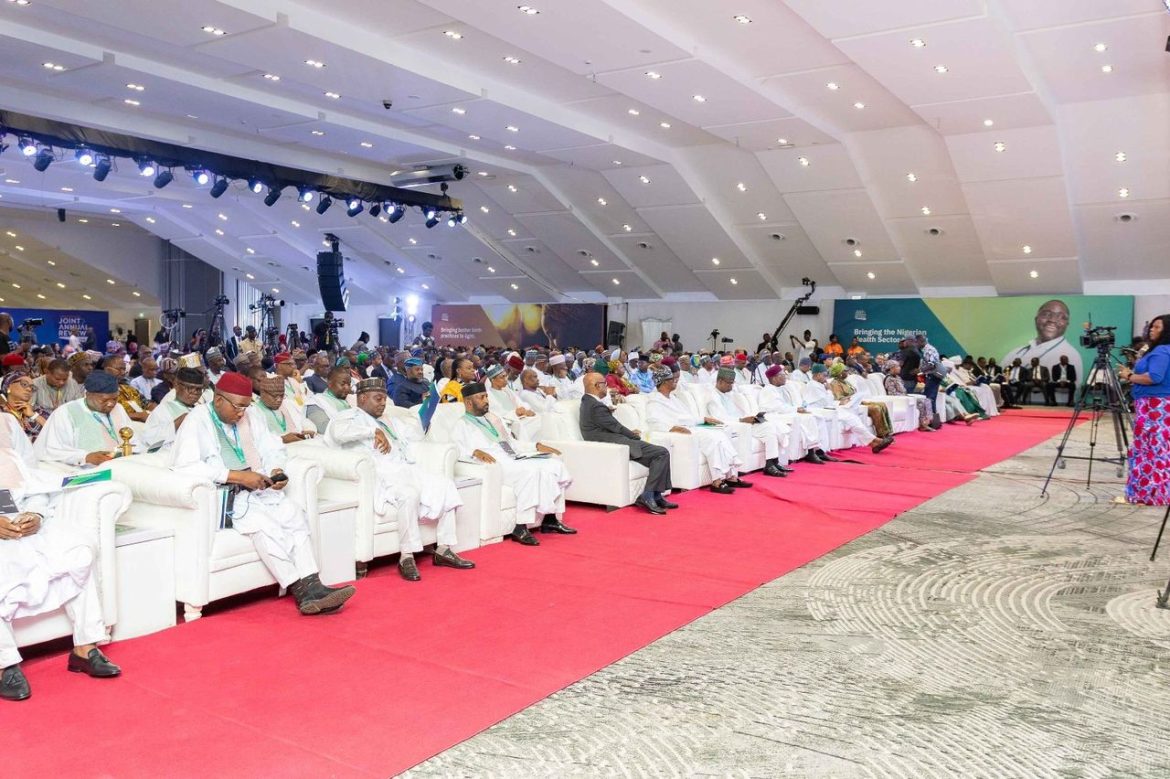By Iyemah David
The Federal Government of Nigeria, State Governments, and faith and traditional leaders have reaffirmed their commitment to strengthening Nigeria’s health system through transparency, accountability, inclusivity, and sustained investment in primary healthcare delivery.
This was highlighted at the 2nd Joint Annual Review (JAR) of the health sector on Wednesday in Abuja, with the theme, “All Hands, One Mission: Bringing the Nigerian Health System to Light.”
Delivering his keynote address, the Chairman of the Nigeria Governors’ Forum (NGF) and Governor of Kwara State, AbdulRahman AbdulRazaq, said the recent N32.9 billion disbursement for primary healthcare delivery had become a game changer.
He noted that the rollout of support under the Sector-Wide Approach (SWAp) and the Basic Health Care Provision Fund (BHCPF) had strengthened State health systems and improved access to quality healthcare nationwide.
“The third round of N32.9 billion disbursed for primary health care, along with the bundled SWAp packages, represents a milestone toward effective financing and predictable implementation,” AbdulRazaq said.
He explained that, for the first time, States now had clear visibility of Federal Government support, which enhanced planning, transparency, and accountability in their Annual Operational Plans (AOPs).
The NGF Chairman hailed Coordinating Minister of Health and Social Welfare, Prof. Muhammad Pate, for championing a data-driven and results-oriented health system through the Health Sector Strategic Blueprint.
“Bringing the health system to light means shining a spotlight on performance, data, and results, ensuring transparency in fund use, evidence-based policies, and equitable benefits for citizens,” he said.
Governor AbdulRazaq also cited the Maternal and Newborn Mortality Reduction Innovation Initiative (MAMII) as a model of federal–state partnership that was saving lives.
He commended the National Health Fellowship for deploying young professionals to Local Government Areas.
He reaffirmed the NGF’s commitment to shared accountability through scorecards and peer-review mechanisms that tracked State performance in governance, financing, and service delivery.
In his remarks, Minister of State for Health and Social Welfare, Dr Iziaq Salako, said President Bola Tinubu’s Renewed Hope Agenda had moved from promise to implementation, with visible gains across the health sector.
Dr Salako said the Nigerian Health Sector Renewal Investment Initiative (NHSRII) was being operationalised to translate hope into measurable results, addressing workforce shortages, infrastructure deficits, and financing gaps through a coordinated strategic blueprint.
He disclosed that over more than new high-impact projects, 13 new federal tertiary institutions, and six cancer centres of excellence had been initiated nationwide under the ongoing reform roadmap.
The ministry, he said, had introduced 21 strategic policies, expanded health insurance coverage, and made significant progress in primary healthcare revitalisation.
Salako announced that the Federal Government was working to increase the BHCPF allocation from one to two per cent of the Consolidated Revenue Fund (CRF) to close financing gaps and support States.
He added that under the Nigeria Digital in Health Initiative, thousands of health facilities had been connected digitally, with millions of patient encounters recorded within the National Digital Health Architecture.
“We are producing more health workers through our expansion strategy, improving retention, and engaging Nigerians abroad as valuable contributors to our system.
“Through the Power 4 Health Initiative, we are also addressing energy poverty to ensure uninterrupted health service delivery,” he added.
He projected that the NHSRII could save N4.8 trillion annually from preventable diseases and reverse N850 billion lost to medical tourism, while cutting maternal and child deaths by up to 50 per cent by 2030.
Dr Salako urged State Governments to provide counterpart funding for the BHCPF and show stronger political will to expand insurance coverage and implement health policies effectively.
Delivering the goodwill message of Sultan of Sokoto, Alhaji Sa’adu Abubakar, the Sultan of Sokoto, the Emir of Shonga, Alhaji Yahaya Haliru, reaffirmed traditional institutions’ commitment to supporting government efforts in achieving universal health coverage.
He noted that good health remained the foundation for education, productivity, and peace, calling for improved collaboration and workforce balance to sustain national progress.
Also speaking, Prof. Samson Fatokun, representing the Christian Association of Nigeria (CAN), reaffirmed the Church’s commitment to work with government and partners to strengthened Nigeria’s health system.
He emphasised inclusivity, accountability, and collaboration as key to building a healthier and more equitable nation.
“The Church stands ready to partner in building an equitable health system that serves all Nigerians,” he said.




